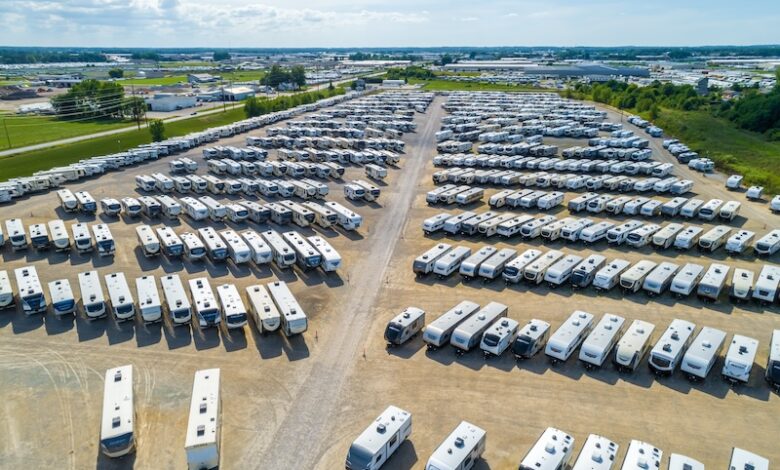Buying an RV at Auction: What Dealers & Private Buyers Should Know
RV auctions can offer strong savings and unique inventory — if you know how to navigate the risks, pricing and inspection process.

The world of RV auctions is a dynamic and potentially rewarding marketplace for both dealers and private buyers. Whether you’re looking to expand inventory or find a good deal on your next motorhome, buying an RV at auction can offer significant savings and unique opportunities. However, navigating this environment requires a solid understanding of how auctions work, what to watch out for and how to do the proper due diligence before placing a bid.
Why Buy an RV at Auction?
RV auctions attract a diverse pool of buyers with one common goal: value. Auctions frequently offer RVs at prices well below retail. For dealers, this means higher margins. For private buyers, it’s a chance to access motorhomes, travel trailers and fifth wheels at a reduced cost.
Many of the units sold at auction come from repossessions, dealer overstock, fleet liquidations or insurance write-offs. Some are gently used; others need work. But regardless of condition, auctions tend to move inventory quickly and offer access to models that may be harder to find through traditional dealerships.
Types of RV Auctions
There are several auction formats that buyers might encounter:
-

Image credit: naum – stock.adobe.com. Dealer-only auctions: These are restricted to licensed RV or automotive dealers and often feature large volumes of inventory at wholesale prices.
- Public auctions: Open to the public, these auctions attract a broader mix of bidders and may include a wider range of RV conditions and price points.
- Online RV auctions: Technology platforms and specialty auction sites have streamlined the buying process, letting bidders participate remotely. These sites offer detailed photos, condition reports and bidding tools, though they do not always offer full mechanical disclosures.
- Government and fleet auctions: These sometimes include retired RVs used for parks or government agencies. They may be well-maintained but aged.
What To Look for Before Bidding
Success at an RV auction starts with knowing what you’re getting into. Following are key factors to consider before raising your paddle — or clicking “Bid.”
- Vehicle history: Always check for title status. A salvage title may mean the RV has been in a serious accident or flood. Clean titles, while preferable, still warrant a full inspection.
- Condition reports: Online auctions often provide documentation of cosmetic and mechanical condition. Review these closely. Pay attention to water damage, mold, roof condition and slide-out functionality.
- Mileage and usage: Higher mileage isn’t necessarily a red flag — especially if maintenance records are available — but it should factor into your valuation.
- Model year and depreciation: RVs depreciate quickly in the first few years. Know the market value of the model you’re interested in and how the auction price compares.
-

Photo courtesy of NRVTA. Inspection options: If attending in person, inspect the RV thoroughly. For online platforms, find out if you can send a third-party inspector before bidding.
- Additional costs: Winning the bid is just part of the expense. Factor in transport, repairs, title and registration fees, and auction buyer premiums.
Risk vs. Reward: Is It Worth It?
Buying an RV at auction can yield great deals, but it’s not without risks. For private buyers, the biggest challenges involve uncertainty and lack of return policies. Once the hammer falls, you’re usually committed.
Dealers, especially those experienced in buying and reconditioning vehicles, may be better equipped to take on rougher units and resell them at a profit. But even seasoned professionals should budget for unexpected repairs or disclosure gaps.
Some benefits that make auctions appealing include:
- Inventory variety: Auctions offer access to a wide array of makes, models, and configurations in one place.
- Competitive pricing: Many units start at low reserves or no reserve at all.
- Quick transactions: Compared to negotiating with sellers, the auction process is fast and efficient.
And some risks to watch for:
- No warranties: Most auction RVs are sold “as is.”
- Unseen damage: Hidden mold, electrical issues or structural problems may not be apparent in photos or basic inspections.
- Limited recourse: Once purchased, it’s difficult to challenge the sale or recover costs due to undisclosed issues.
Smart Strategies for Success
To maximize your success at auction, both dealers and private buyers should follow a few tried-and-true strategies:
- Do your homework: Research the model, market value and typical issues to look out for.
- Set a budget and stick to it: It’s easy to get caught in a bidding war. Know your maximum and don’t exceed it.
- Ask questions: If allowed, inquire about the RV’s service history, damage reports or reason for auction.
- Attend multiple auctions: The more you observe, the better you’ll understand pricing patterns and buyer behavior.
- Understand auction terms: Read the fine print on buyer fees, payment deadlines and pickup policies.
Special Considerations for Online RV Auctions
Online RV auctions provide greater access to inventory and convenience but come with unique challenges. Without the chance to inspect the RV firsthand, buyers must rely on photos, inspection reports and descriptions, making it essential to scrutinize every detail for signs of wear, like water damage or rust.

Trusted auction platforms offer seller ratings, condition reports and transparent bidding. Stick to reputable sites to avoid scams or title issues, and consider hiring a local inspector before bidding to verify the unit’s condition.
Bidding strategy matters — placing bids too early can drive up prices, so many experienced buyers wait until the last minute. Additionally, buyers are responsible for transport and delivery costs, so planning logistics in advance ensures the final cost aligns with your budget.
Navigating the RV Auction Process With Confidence
Whether you’re an RV dealer aiming to refresh your lot or a private buyer looking for a smart bargain, auctions offer real potential if approached wisely. The key is preparation. Understand the auction environment, do thorough research and know your risk tolerance. With the rise of online RV auctions, the process is more accessible than ever, but vigilance and smart strategy remain essential. By blending caution with opportunity, you can navigate the auction process effectively and drive away with an RV that meets both your needs and your budget.



